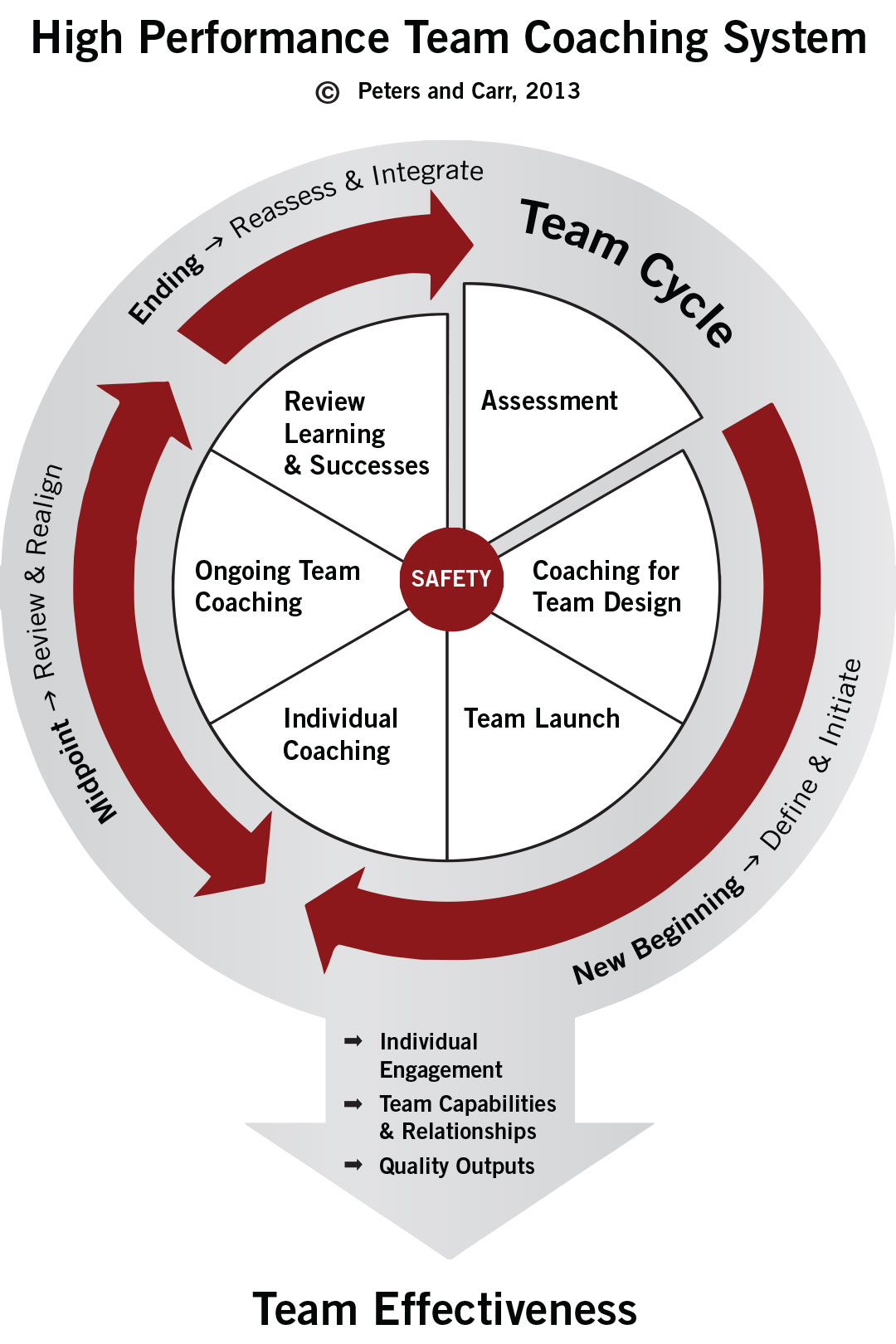Executive & Team Coaching

Team Coaching
Coaching engagement for leader development
1
Coaching engagement
2
Protocol of engagement
3
Team coaching model
4
Team coaching phases
5
Team Diagnostic™ Assessment
In order to have teams fully engaged, we operate from a Systems Approach in the belief that teams are dynamic and have the potential to learn, to evolve, and to adapt to their context or environment. The focus is not on the individual but on the relationships formed between members of the team in order to maximize potential and release positive energy.
A Solution Focused Coaching orientation challenges the team to reflect on how they are showing up collectively and how they are supporting each other rather than dwelling on mistakes and missed opportunities. This strengths-based, future-oriented approach facilitates purposeful, positive change by emphasizing individual's resources and how these can be used in pursuit of the team's goals and thus the enactment of change.
2Protocol of engagement
Our coaches partner with the leaders so they will be more strategic and purposeful, improve their effectiveness, and enhance their own team leadership skills.
Solution Focused Team Coaching
- helps the team to define and align their vision of the team
- examines the team's ability to adapt to and manage change
- explores interpersonal dynamics in order to gain insight and self-awareness
- helps the team to discover the impact of personality on work style
- reiterates the power of emotional intelligence
- helps the team to capitalize on strengths and identify areas for growth
- boosts the power of decision making, problem solving and collaboration
- helps the team to move past their blind spots
- creates an understanding of conflict styles and their impact on the team
- motivates and inspires the team to build powerful engagement
An educational coaching component is also offered in terms of workshops on any of the above to embed learning and new behaviors required of the team, so it will create "sticky learning." These workshops are offered in 1 or 2-day segments. The team and leader will also have the opportunity to learn (or refresh) Bruce Tuckman's stages of team development. This will help the team to discuss their shared perceptions of what is transpiring at any stage of the team and to help navigate change and uncertainty.
1Coaching engagement 3Team coaching model
The framework for High Performing Team Coaching (HPTC), posited by Drs. Jacqueline Peters and Catherine Carr, illuminates the key components that drive interventions with a team in order to maximize its collective talents and resources.
The HPTC system builds on coaching skills and the International Coach Federation (ICF) Core Competencies provides an overarching framework for the model.
Team coaching involving the HPTC system will last nine to twelve months to ensure the team objectives are met and remain in focus.

High Performance Team Coaching: A Comprehensive
System for Leaders and Coaches (2013)
2Protocol of engagement 4Team Coaching Phases
Assessment - assess team performance readiness/interview group members
- Discussions with stakeholders - re: challenges/opportunities faced by the team
- Contracting
- Understanding the organizational context (environment/culture/norms)
- Administer assessments: Team Diagnostic™, MBTI®, Emotional Intelligence
- Team Purpose - direction, purpose that drives the team, derailers
- Team Structure - norms, agreements, support
- Right Talent - members, resources, current information
- Explore assessment data
- Creation of Team Charter
- Compelling Direction
- Team Goals
- Working Agreements
- Review processes and performance
- Reflect on learning
- Refine strategy to best achieve goals going forward
Ongoing Team Coaching - Leader and Peers, Collaboration and Productivity, Team Leader Modeling and Support, Peer Coaching
ENDING - REASSESS AND INTEGRATE
Review Learning and Successes
- Identify and build upon success factors
- Learn from challenges
- Assess progress towards goals
- individual engagement - trust, understanding, empowerment, commitment
- team capabilities and relationships - developing, planning together
- quality outputs - innovation, utilizing diversity
- develop a plan to maintain progress with intermittent, follow-up sessions
3Team coaching model 5Team Diagnostic™ Assessment
Dr. Zina Suissa is certified in the Team Diagnostic™ Assessment through Team Coaching International, a leading business coaching firm that specializes in coaching teams as systems.
The Team Diagnostic™ Assessment measures the team as a system in its current state. The assessment provides a benchmark and a detailed map for ongoing team development. It also yields a snapshot of team performance measuring 14 different productivity and positivity strengths. Productivity factors help the team to achieve results, complete tasks, and stay on course to achieve goals. With regards to Positivity factors, it is the mutual relationships, as well as the character and atmosphere of the teams, as a system, that are important.
All responses generated by the assessment are anonymous, which creates for open, honest feedback.
For an overview of each of the views generated by the Team Diagnostic™ Assessment, please see the following.
Team Diagnostic View™
- Measure Team Conditions
- Improve Team Performance
- Sustain Team Results
Team 360 View™
- Invaluable Feedback
- Specific
- Measurable
Team Leader View™
- One Tool with a dual purpose: View of team & impact of leadership
Organization View™
- Measure Organizational Strengths
- Improve Culture and Performance
4Team coaching phases
